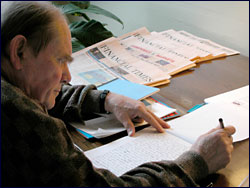
|
Distinguished
Professor at the Salk Institute for Biological Studies
"I’m called ‘the father of the worm,’ which I don’t think is a very nice title," says Sydney Brenner, a distinguished professor at the Salk Institute for Biological Studies. In the early 1960s, Brenner recruited the one-millimeter nematode, Caenorhabditis elegans , as the ideal model organism for studying cell differentiation and organ development. In 2002, he and his worms received a Nobel prize, and his work has made C. elegans a research standard. Brenner has had a long friendship with James Watson and Francis Crick, and he was one of the first people to see their model for DNA’s structure . His experience working with them in pre-genome days of biology influenced his thinking about C. elegans . The new, high-tech analytical tools were distancing researchers from living things, he thought. "What I wanted was for people to feel they could come in and actually look at a real animal," he says. "Francis Crick used to say, ‘Sydney likes worms because they wriggle and you can watch them wriggle.’"
Along with doing
genome research, Brenner advises the government of Singapore on
how to conduct research. He’s a firm believer that learning
to think about scientific problems can help people to think about
other kinds of problems as well. "I think science is the way
to solve problems. It’s the best way we know. Magic doesn’t
work. Prayer doesn’t work too well, either."
|
|
|
|||||||||||||||
